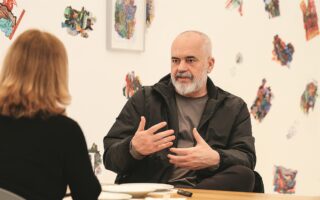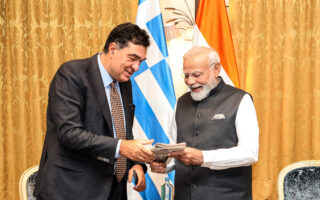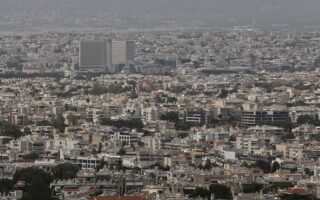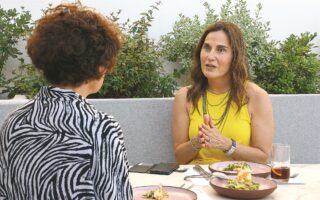The arrest of Beleri ‘has nothing to do with me’
The Albanian Prime Minister says authorities will probably wait for the trial of the ethnic Greek mayor-elect before calling new elections in Himare
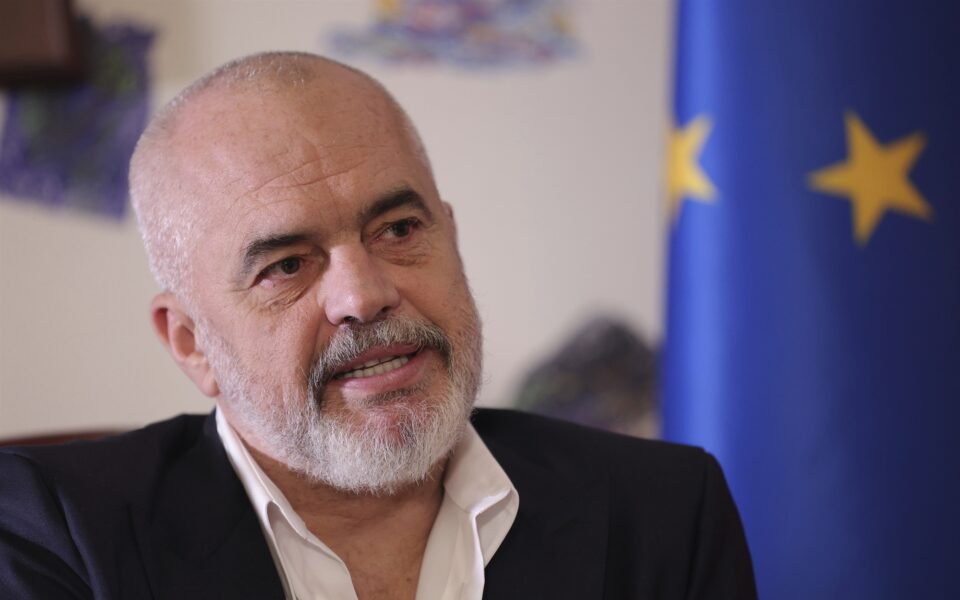
Last Monday morning, I received a message from an unknown Albanian number that criticized a report I had written in last Sunday’s Kathimerini on the imprisonment of Fredi Beleri, the ethnic Greek mayor-elect of the city of Himare in southern Albania, in which the Albanian prime minister is accused of involvement in his case. The sender of the message claimed to be Edi Rama himself and asked to comment on the report with an interview. I sent him a curt reply: “Beleri’s treatment is unfair and unjust. He was first set up by the authorities and then, after he was accused of trumped-up charges, he was conveniently trapped in the norms, clauses, technicalities and intricacies of the country’s new judicial system – so now you can rightly claim that you cannot interfere.” But was it really Rama? “How do I know it’s you? It would be better if your office called.”
Instead of a reply, the sender sent a video. “You can see me. If you’re convinced it is me and not some comedian impersonating the prime minister, we can move on.” I thanked him with another video and that is how we ended up with this interview that took place last Thursday via Zoom. It was an unexpected and unusual communication between a prime minister and a journalist, which Rama uploaded on his own social media on Thursday. Rama has supporters and critics in Greece. The Beleri case increased the number of the latter. But he is not an ordinary politician. He is a painter and a sculptor who has been recognized in Europe and the US since the 1980s when he lived in Paris. And he still paints on a daily basis.
Greek Premier Kyriakos Mitsotakis and the then foreign minister and current defense minister, Nikos Dendias, attended the opening of his exhibition at Zappeion Hall just five months ago. The Beleri case has casting a heavy shadow over Greek-Albanian relations, but the interview could only begin by admitting that Edi Rama is certainly an important politician in our region.
Prime Minister, to many people you seem like a literary hero from a Milan Kundera novel. A bold artist, rebelling against communism, then living in Paris, returning and becoming the most successful politician of your generation – the only one that has been elected prime minister three times. Albania’s GDP has increased 50% since 2013, when you came to power. A few years ago you said in an interview with The Guardian that your aim is “to place ourselves in a safe zone from the curse of history.» Have you succeeded? September 15 will mark 10 years since you became prime minister and I would like you to tell us something you are proud of and something that you might regret.
Thank you for this charming introduction but I would say first of all that I don’t feel a hero, this is what I sincerely think. I am going to tell you something. Beards were banned in communist Albania. So, in the airport there was a barber shop and every tourist that had a beard or had a long hair, they were told to go to the barber shop to take off the beard – Karl Marx couldn’t enter Marxist Albania without shaving well and cutting his hair and this is not a joke. Yes, I am proud of many things we have succeeded in doing but we keep going, I am not happy, I am not satisfied. I am a very self-critical person, although it doesn’t look like it, but believe me, I am. My harshest judge outside my house is myself and in my house, the harshest is my wife – so I am kind of safe from believing I am hero.
Did you feel personally offended that Prime Minister Kyriakos Mitsotakis did not invite you in Athens for last Monday’s informal dinner with the leaders of the Western Balkans?
First of all, I have learned during this life that feeling personally offended is not a good thing to live with. I never take it personally. I would simply not do [the same] and more than that I think the purpose of the meeting and the initiative Kyriakos took is something really big. So, connecting this very important initiative to send a message to me, to Albania, for this issue, whatever importance Greece puts to it, this is not the right way, I guess. I think that especially when things that are unpleasant happen between friends, friends have to talk more to each other, to try to understand, to honor friendship by being very, very open. So for me, Kyriakos was a friend, and he is still a friend I like and respect.
In December 22, 2022 you welcomed Mitsotakis at the village of Dervican (Dervitsani in Greek), a few hours after he had campaigned with Beleri in Himare. Did you ever talk to Mitsotakis at the time about your reservations toward Beleri?
No, and I don’t think he campaigned really with Beleri. We were in Dervitsani, yes, I was happy to be with him and I promised to put a sculpture at the reconstructed square there to honor his late father, Prime Minister Konstantinos Mitsotakis who was the first – and the last until Kyriakos came – prime minister to come to Albania and meet the Greeks in the area. Kyriakos’ father’s visit was a very important moment in the history of this community. I did not order a halt to the sculpture, we want it to be there before October 28, which is an important date for Greece. So, whoever may come from Greece on this day will find Konstantinos Mitsotakis’ bust in the square. This is how I think we honor the bond between Albanians and Greeks.
Let’s move on to the thorny issue. Why did you choose to personally attack a mayoral candidate? During the election campaign you called Beleri “illiterate,” “scum,” and “an ugly face that would scare.” You are the prime minister and taking into consideration your institutional role and position, wasn’t your intervention tantamount to a call to the institutions of the police and the judiciary to single out, to target this candidate?
Thank you for the question. First of all, sometimes in politics you may say things you are not proud of, and in this campaign, yes, I may have said some things that I don’t really feel well about. The reason why I was harsh toward him was because he made some very unacceptable statements – like he would bring forward the process of Hellenization of Himare. You know, this is not something you say in Europe. [He said] that he was there to liberate Himare, I don’t know from whom. But I should ask a rhetorical question: If I was aware that there was an investigation started from someone’s report to the prosecutor, would I expose myself in this frank language? If I knew that he would be arrested, would I have been exposed in that frank language? I don’t think so. I learned about his arrest when the police were in action. I called the police chief and asked, “What is this?” He said, “We have an arrest warrant from the prosecutor and it is based on hard evidence of vote buying.” I said: “Listen, you’d better be sure of what you are doing. Because this can be very nasty and this has to be based on hard evidence.” It was not something I was involved in.
There is a possibility that both countries were lost in translation regarding the word “Hellenization.” Friends of Beleri insist that he never talked about “Hellenization” but about “Hellenism.” He told the people in Himare that his victory would be good for “Hellenism” – i.e, for the ethnic Greeks of Himare – but it was mistranslated into Albanian as “Hellenization.”
Listen, at the end it’s not just this word, and overall it’s not whatever the guy represents, which is a totally different view of the world [compared] with [mine]. This has nothing to do with what happened. What happened next was not politics, it was a matter of the rule of law.
According to my sources in Athens, the handling of the Beleri affair is threatening Albania’s reputation in the EU for three reasons: First, we know that Beleri was not arrested at the scene of the alleged crime. Second, he was denied special leave to be sworn in as mayor. And third, he is still in prison, although there is no risk of committing the same alleged crime again – there are no elections to be influenced, witness examinations have been completed, so he cannot interfere with it, and he is an elected mayor – why would he escape abroad? Therefore, Athens is saying that we have a wrongful arrest, a wrongful detention and a wrongful denial of someone’s rights. That’s why Athens has taken this position on the issue.
I understand that, but I don’t agree with any of it and first of all I don’t agree that a foreign country, a foreign government, can make comments about the justice system actions of another country – even if they’ve been very friendly countries. This is not European, in my view. And then, we don’t know everything about the issue. We will know everything when the special prosecutor will present the full evidence in front of a courtroom. But based on what we know, first he was caught in action of vote-buying. Second, nowhere exists in any Albanian jurisdiction the power of the government or of the prime minister to issue permission for a pre-trial detainee to leave jail. And finally, he is detained because in the three levels of the judiciary of Albania he could not get released. So, my question is very simple: Where am I and where is the government of Albania in all this? The Special Prosecution office and the Special Court Against Corruption have been created as part of a justice reform. From A to Z it was conceived, it was written, it was approved and it started to be implemented under the strict monitoring of the EU and under the full support of the US and the EU, Greece included. And these bodies have also jailed in pre-trial custody four or five mayors from the Socialist Party of Albania if I have not lost count.
These were incumbent mayors. They got arrested for crimes they allegedly committed during their tenure.
Yes, but I am saying all these because I wanted to say that these structures are completely independent from every influence and any possible interference.
The Greek government points out that Beleri is the only person that is being held for this specific crime in Albania. The punishment is disproportionate – for just almost 300 euros of alleged vote-buying. There were 31 incidents of alleged bribing on the same day in May but all those people are free and only one candidate accused of the same crime – Beleri – is in prison.
My answer is very simple: Firstly, the arrest and the imprisonment of the one and the release of the others has nothing to do with the government or me. Secondly, the imprisonment of [Beleri] is due to the fact that he was caught red-handed. The other cases are based on [accusations] of others and investigations are ongoing. So, the comparison does not really stand.
According to a video that was posted on Facebook, when Beleri was arrested, he was in a different restaurant from the one where the alleged crime was committed by somebody who worked for him and he was talking with his cousin and a lawyer. Beleri was not at the scene of the alleged crime.
Nobody knows all the evidence apart from the prosecutors. The evidence is not public. It is still under investigation until the moment they are in court and they present it in front of the judge. So, when this happens, it will be public knowledge and everyone could then judge. I don’t comment because I never comment about what these institutions are doing and you will not find a single case to prove the contrary, although I might not have the same view as the prosecutors on each case. The only government interference since the justice reform took its course is the interference from the Greek government. From the Albanian government there is no and never will be any interference.
‘I think that especially when things that are unpleasant happen between friends, friends have to talk more to each other, to try to understand, to honor friendship’
Are you prepared to support politically the option of Beleri taking the oath of office in prison in the presence of a notary?
Can you find the slightest window in our law permitting a swearing-in in prison with the presence of a notary? There’s no such thing.
Legal experts in Athens say that there is a precedent in Tirana when, on November 14, 2019, Arta Vorpsi, a member of the Constitutional Court, overcame then-president Ilir Meta’s resistance to accept her by taking the oath in the presence of a notary.
Listen, first of all she was a free person that had the idea to do that and, by the way, it did not work for her. Secondly, we are now talking about someone who is jailed. When it comes to the oath of office the law is specific. The oath is taken in front of the city council and nowhere else.
The head of the prison is not a judge. He’s an employee of the Ministry of Interior and he could have given permission to Beleri to appear in the city council. But he didn’t.
The head of the prison does not have such a right to give permission because the head of a prison cannot give permission to pre-trial detainees. Only the court can do that and the court refused to do so.
So, Prime Minister, are you going to call for new elections in Himare?
Here, you may get a scoop.
I am happy to get a scoop, certainly.
Well… I am not sure you should get it because… first of all, in Albania it’s not the government that calls for new elections, it’s the president. But here’s how the process goes: If someone that is elected does not show up for the oath for 90 days then it’s up to the government to take care of it by discharging this person, by putting a caretaker in place until new elections happen after the president has declared them. I asked my lawyers to prepare an argument and I don’t know what the argument will be – but I think that this case is particular – there’s no precedent for it. So, my instinct or my natural reaction is that we maybe have to wait for the trial. So we may not proceed until he is proven guilty or not guilty. But this is not a legal opinion, this is just what I think we should do based on the fact that we don’t have a precedent. But yes, we may go either way based on the argumentations of our legal office. I think that there’s a possibility that we won’t act until the court decides. In this case we give to everyone the chance to look into it until the end. If legally is not possible, then we have to discharge him.
I read in your biography some details and you told me just before that your mother is from the village of Vuno, in Himare. Do you feel a little bit like a native of Himare?
Listen, I don’t know if you have in Greece the same, to say that a man is always coming from the village of his wife…
Yes, it is said in Greece, too.
My wife is from Tirana, I live in Tirana and I feel like a native of Tirana but, yes, I have a very strong bond with Himare, with Vuno, a very strong bond, my mother was a very typical Vouniotissa, for Vuno they say that the normal fever is 38, so I like it.
You said “Vouniotissa,” so you know Greek…
I don’t know Greek, my brother knows more, he learned some while he was in Corfu. And I really regret that I am not able to speak this language because to me it sounds like a beautiful language and then it is the language of great people.
And as you feel strongly about Himare, do you have a message to people of the Greek minority living in the region?
I think that any Greek living in Himare, or anywhere else, they know very well that they live in this country in full equality with Albanians. With the good and the bad. I don’t know a problem facing the Greeks that is just faced by Greeks – if you know one, tell me.
I heard that there is still a problem regarding the property rights of the citizens of Himare. And it is said in Athens that property titles are given to citizens of Himare only if they have already agreed to sell them to big strategic investors. In the 10 years you have governed Albania and three years after the Parliament approved the new law on properties, do you know perhaps how many ownership titles have been given to Himare residents without these residents selling them immediately to strategic investors?
First of all this is a total spin. Because the story of the property titles in Albania is something very painful. We had to go through the hell of full nationalization and then we had to go through the purgatory of transition – where the property titles were the first big victim. There was great chaos in every square kilometer of the country. We still have big issues in the north where there are huge properties not yet registered. Second, to say that properties are recognized only after the owners have made deals with whomever is not logical.
Because there’s no deal that you can make and development permissions you can get if you don’t have the titles. So, you need to have the titles. This is crazy. Do you know how much the land near the Himare coast is sold for? We have today in Himare properties being sold for much more than in many parts of Corfu. The titles of properties given to the Greek minority during my tenure are countless. Compare them with what happened before: Zero, zero! Not one, zero. The Greek minority today go to churches that have property titles. The churches did not have property titles as the communists removed them. And my government gave them the titles.
So there’s no specific problem with titles in Himare…
All problems with property rights in Albania from north to south are the same. The trouble is that some people who pretend to be more intelligent than others know how to use the Greek flag as a credit card. They know to use the Greek flag as a way to pour poison and to support their very petty interests. It is something some people do – Albanians do it by using the Socialist Party flag or the Democratic Party flag or other parties flags – because, you know, they can’t claim they are a minority here being devastated, or a member of a minority being ripped off. When it comes to some people in the Greek minority they are very good at manipulating Athens and Athens is not good at understanding that the best chance they have of improving relations and improving the life of the Greek minority is not [through] a Greek, [but] through me, not because I am working for Greeks, but because I am working for everyone, and I think that the Greeks in Albania are a treasure and we have to treasure their presence, that’s it. But as there are some Albanians that I am not happy to share the same blood with; there are some Greeks you should not feel very proud of sharing the same blood with.
There are stories about members of the government supporting special interests in Himare. One of them is the story of Artan Gaci, the husband of Foreign Minister Olta Xhacka, who is the owner of AGTCC Hotel Management, and that company has been designated as a strategic investor in Himare. There was a big debate in Parliament and in the Supreme Court. What’s your comment on that?
Listen, if debates in Parliament were proof, then you should not be talking to me, you should inform the police where I am. Every hotel in Albania that is on the beachfront has permission to use the beach. So, the permission that was given [to this group] was among thousands and thousands of permissions from the north Adriatic to the south. The question was not raised by owners that were allegedly ripped off. On the contrary, the owners there made a deal and when owners are unhappy they don’t make a deal or they speak out if they have been wronged.
My question is simple: What do the people who react want? Do they want the people that live in Himare to develop their land or to stay there like Robinson Crusoe? People develop their land, based on plans of course. They get money, they get a lot of money. We want to develop Himare, we want to develop every part of the country, based on contracts, and you cannot find me one case […] where we took land, we allowed strategic investments by undermining the owners’ rights.
Recently, in your Chatham House appearance in London, you said, “What I fought for is a country that is open, that’s free.” It would be quite a bold gesture toward the Greeks of Himare if you agreed that the classes of the last two years in the private high school in Himare would be done in Greek, as is the case in the other grades. Would you be willing to consider such a gesture?
I am not familiar with this issue, frankly I am not. It is the first time I’ve heard about that. I will check it. I think learning Greek is beautiful, learning every language is beautiful, and learning the language of a neighbor is fantastic. I believe it. I am too old now to learn Greek, but I would love it. Perhaps I can join in a course in Himare.
It is known that you have a political collaboration with former British premier Tony Blair. Would you accept Blair to act as an intermediary between you and Mitsotakis to resolve the Beleri issue?
What would Tony Blair would do? At the end, he would probably get confused between a Greek and an Albanian. It’s better to talk about this issue together, Kyriakos and me. Kyriakos, to me, is a modern leader and what is happening now is not modern, it is old.
